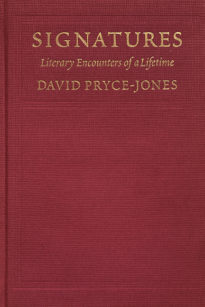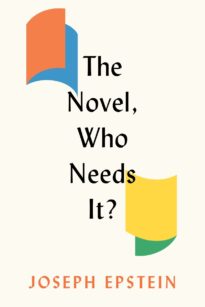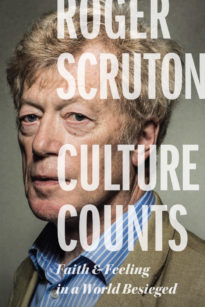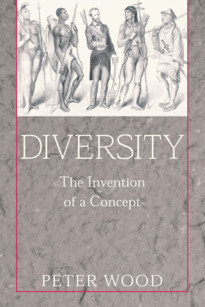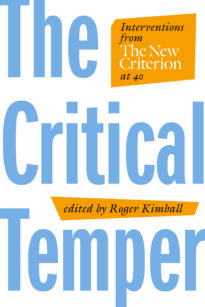On the occasion of its fortieth anniversary, The New Criterion has brought together a winning collection of essays demonstrating the range and acuity that has established the magazine as America’s foremost review of culture and the arts. With contributions by Bruce Bawer, Anthony Daniels, Denis Donoghue, Joseph Epstein, John Steele Gordon, Victor Davis Hanson, Charles Hill, Donald Kagan, Roger Kimball, Heather Mac Donald, Myron Magnet, Andrew C. McCarthy, David Pryce-Jones, Andrew Roberts, Alexander McCall Smith, Aleksandr Solzhenitsyn, Keith Windschuttle, and many others, this collection of more than fifty essays brings you the best of the best: incisive cultural criticism, scintillating historical analysis, and robust commentary about the way we live now. Edited by Roger Kimball, this spiritual Baedeker is a timely repository of timeless writing about the figures, controversies, and challenges that define our life in the first decades of the twenty-first century.
Free shipping on all orders over $40
The Critical Temper
Interventions from The New Criterion at 40
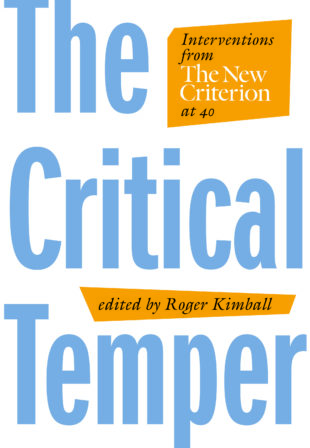
Also Purchase as e-Book
Publication Details
Hardcover / 576 pages
ISBN: 9781641772174
AVAILABLE: 9/21/2021
- Media: Request a Review Copy
- Academia: Request an Exam Copy
About the Author
Roger Kimball is President and Publisher of Encounter Books and Editor and Publisher of The New Criterion. He writes regular columns for American Greatness, The Epoch Times, and The Spectator, US edition.
Praise
Excerpt
A
n old Soviet joke poses the question: What was the most important world-historical event of the year 1875? Answer: Lenin was five years old.
The point of the joke, of course, is that the Soviets virtually deified Lenin. Criticism of him was routinely referred to as “blasphemy,” while icon corners in homes and institutions were replaced by “Lenin corners.” Lenin museums sprung up everywhere, and institutions of every kind took his name. In addition to Leningrad, there were cities named Leninsk (in Kazakhstan), Leninogorsk (in Tatarstan), Leninaul (in Dagestan), Leninakan (in Armenia), Leninkend, Leninavan, and at least four different Leninabads. On a visit to the Caucasus I remember being surprised at seeing Mayakovsky’s famous verses about Lenin inscribed on a mountaintop: “Lenin lived! Lenin lives! Lenin will live!” The famous mausoleum where his body is preserved served as the regime’s most sacred shrine.
As we approach the 150th anniversary of Lenin’s birth, understanding him grows ever more important. Despite the fall of the Soviet Union, Leninist ways of thinking continue to spread, especially among Western radicals who have never read a word of Lenin. This essay is not just about Lenin, and not just Leninism, the official philosophy of the USSR, but also the very style of thought that Lenin pioneered. Call it Leninthink.
Lenin did more than anyone else to shape the last hundred years. He invented a form of government we have come to call totalitarian, which rejected in principle the idea of any private sphere outside of state control. To establish this power, he invented the one-party state, a term that would previously have seemed self-contradictory since a party was, by definition, a part. An admirer of the French Jacobins, Lenin believed that state power had to be based on sheer terror, and so he also created the terrorist state.
Stephen Pinker has recently argued that the world has been getting less bloodthirsty. The Mongols, after all, destroyed entire cities. But the Mongols murdered other people; what is new, and uniquely horrible about the Soviets and their successors, is that they directed their fury at their own people. The Russian empire lost more people in World War I than any other country, but still more died under Lenin. His war against the peasants, for instance, took more lives than combat between Reds and Whites.
Numbers do not tell the whole story. Under the Third Reich, an ethnic German loyal to the regime did not have to fear arrest, but Lenin pioneered and Stalin greatly expanded a policy in which arrests were entirely arbitrary: that is true terror. By the time of the Great Terror of 1936–38, millions of entirely innocent people were arrested, often by quota. Literally no one was safe. The Party itself was an especially dangerous place to be, and the NKVD was constantly arresting its own members—a practice that was also true of its predecessor, the Cheka, which Lenin founded almost immediately after the Bolshevik coup.
NKVD interrogators who suspected they were to be arrested often committed suicide since they had no illusions about what arrest entailed. They had practiced exquisite forms of torture and humiliation on prisoners—and on prisoners’ colleagues, friends, and families. “Member of a family of a traitor to the fatherland” was itself a criminal category, and whole camps were set up for wives of “enemies of the people.” Never before had such practices defined a state.
For good reason, many have traced these practices to Lenin’s doctrines. In his view, Marx’s greatest contribution was not the idea of the class struggle but “the dictatorship of the proletariat,” and as far back as 1906 Lenin had defined dictatorship as “nothing other than power which is totally unlimited by any laws, totally unrestrained by absolutely any rules, and based directly on force.” He argued that a revolutionary Party must be composed entirely of professional revolutionaries, drawn mainly from the intelligentsia and subject to absolute discipline, with a readiness to do literally anything the leadership demanded.
These and other disastrous Leninist ideas derived from a specific Leninist way of thinking, and that is what this essay focuses on. I know this way of thinking in my bones. I am myself a pink diaper baby and I remember being taught this way of thinking, taken for granted by all right-thinking people. Memoirs of many ex-Communists, from David Horowitz to Richard Wright, confirm that, more than doctrines, it was the Leninist style of thought that defined the difference between an insider and an outsider. And that way of thought is very much with us.
—from “Leninthink” by Gary Saul Morson
.

